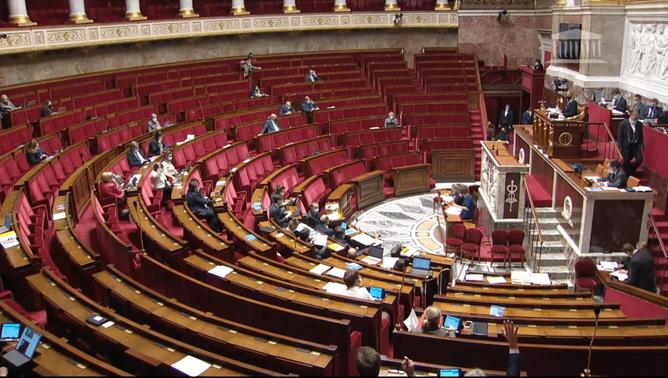The government has passed an amendment to the future finance law which would allow the permanent containment of toxic waste to be launched at Stocamine. A court decision had however suspended the final burial.
The debate lasted five seconds, on a Friday evening, in a largely empty hemicycle of the National Assembly. Or rather, there was no debate. Friday, November 12 around 9 p.m., the few deputies present are studying the chain of amendments to the Finance Bill (PLF) for 2022. "It is a question of granting a State guarantee to the potash mines of Alsace" , simply exposes the Minister Delegate in charge of Public Accounts, Olivier Dussopt. “Who is for? “Asks the session chair, Laetitia Saint-Paul (LREM). A few arms are raised timidly. “Who is against? Nobody shows up. This "additional amendment" from the government is adopted by a show of hands. The session continues with another modification, which concerns hydrogen. (see the sequence from 35’50”)
The law was then passed in its entirety on Tuesday, November 16 by 348 votes against 205 during the solemn vote. There is no surprise in the result on this general and highly symbolic text. The deputies of the majority groups (LREM; Modem; Agir) all voted in favor, and those of the opposition (FN; LR; PS; PC; LFI) voted against.
Bypassing the court decision
Except that this specific amendment, voted on the initiative of the government, on the last day of the examination of the law, aims to circumvent the decision of the administrative court of Nancy appeal of October 15 about the 42,000 tonnes of toxic waste buried in Stocamine, a former potash mine in Wittelsheim. The magistrates had then prohibited the total and unlimited confinement of this toxic waste, decided by a prefectural decree of March 23, 2017. A decision which had however been supported by the Minister of Ecology Barbara Pompili in January 2021, when she had – in turn – ordered their final and total confinement. It therefore appealed to the Council of State to challenge the decision of the Nancy Court of Appeal, a decision which prevents the filling of the old mine.
The magistrates of Nancy had therefore invalidated this decree because it did not provide for sufficient financial guarantees for "the cost of the work and monitoring" that the Société des Mines de Potasses d'Alsace (MDPA, a subsidiary of the 'state in charge of the site).

With this amendment, the government has therefore found a solution: it provides a guarantee of 160 million euros until 2030 and reaffirms this “derogation” from the Environment Code. If the MDPA company were to be liquidated, it would be "for example" the Environment and Energy Management Agency (Ademe) or the Geological and Mining Research Bureau (BRGM) which would lead the end of operations. , adds the statement of the amendment. According to the analyses, contact between the stored toxic waste and the groundwater in Alsace, where drinking water is drawn, will occur within a few hundred years.
A very discreet vote, which escaped those familiar with the case
But this express vote and its repercussions seem to have escaped most of the followers of the case. No one noted this situation in the weekend preceding the adoption of the law on Tuesday, November 16. Moreover, the two deputies of the sector, Bruno Fuchs (Modem) and Raphaël Schellenberger (LR), who respectively voted "for" and "against" admit: they were not aware that they were voting on this guarantee during the final vote. Both say they discovered it after November 18 when reading an article in the newspaper Alsace.
For Bruno Fuchs, the maneuver was nonetheless predictable:
For the opponent Raphaël Schellenberger (LR), the sequence reveals the powerlessness of the deputies to be able to track down all the government amendments:
For the lawyer for Alsace Nature, François Zind, this amendment has no impact on the appeal to the Council of State "because it is the decree of 2017 that will be judged". According to him, the government is preparing legally to issue a new order. “But the burial being final, it needs a final control. However, the guarantee is only announced until 2030, ”he notes. The situation "recalls 2004 and the amendment of Michel Sordi (deputy of the majority on the right and of the constituency concerned editor's note), which allowed non-reversibility".
Will the Senate have the opportunity to react?
The finance bill must be examined by the Senate, then voted on at second reading by the National Assembly in December for the final adoption. Senator Jacques Fernique (EELV) "hard to believe" that no Alsatian deputy was aware of the maneuver. “A Context article mentioned it well before the vote (November 9),” he notes. He wonders if the deputies of the majority or of the right are still mobilized on the subject. "There were few reactions to the court decision, then to Barbara Pompili's appeal".
The prospect of the presidential election, which will interfere with the parliamentary crossover, worries Jacques Fernique:
Despite the anger over the way things are done, a certain fatalism crosses the divisions. “We can have this debate at second reading, but there is no majority to go against a government amendment on this subject, which outside of Alsace, no one has mastered. Even the Bas-Rhin deputies of the majority should follow the government, ”analyzes Bruno Fuchs. As for Raphaël Schellenberger, he projects himself into the aftermath. “I filed a European resolution so that the control of the burial is independent, and not placed under the control of the prefect. At one point or another, we will bury and we have to know what”.










Samsung Galaxy S22, Uncharted et pl...
Tesla: you can now enjoy YouTube in...
EM – Butler vs Purdue Basketball Li...
Nantes. A child victim of an acci...